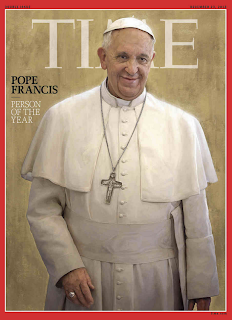Image: Time.com
Time’s “Person of the
Year” is Pope Francis.
As they wrote in their Dec. 11 announcement:
“He took the name of a humble saint and then called for a
church of healing. The first non-European pope in 1,200 years is poised to
transform a place that measures change by the century.”
Some members of the Fordham faculty shared their thoughts on
the magazine’s pick of the compassionate Jesuit from Argentina.
"A year ago, very few would have suspected that the
leader of the Catholic Church would become Time magazine's ‘Person of the Year.’ Since his election
on March 13, Pope Francis has mesmerized those inside and outside the
Catholic world with his personal simplicity, commitment to the poor, and
emphasis on the joy of the gospel. It is no surprise that they named him Person
of the Year. What remains to be seen are the next steps that Pope Francis will
take—the world will have to wait until 2014 to discover if substantive changes
in Roman Catholic life and practice will follow upon what has certainly been a
striking shift in tone at the highest levels of the Vatican.” – Patrick
Hornbeck, Ph.D., chair of the theology department. Hornbeck was on Al
Jazeera America recently
discussing the Pope’s recent comments on capitalism.
"First and foremost, [Pope Francis] exemplifies a radical
prioritization of the poor. In so doing, he combines prophetic modes of
leadership with the traditional priestly ones. Pope Francis has shown that he
prioritizes the concrete—each person—over an abstract principle. And he
maintains the capacity to surprise everyone, even those closest to him. In all
these ways, he imitates the most popular leader ever to have lived,
Jesus." – Michael
Peppard, Ph.D., assistant professor of theology.
"It's an honor that seems fitting for a pope who's
shaping up to be a game-changer when it comes to Catholicism's place in the
world today." – James
P. McCartin, Ph.D., associate professor and director of Fordham’s Center on
Religion and Culture.
Being that Fordham is the “Jesuit University of New York,”
we even had one of our Communications and Media Studies faculty members weigh
in:
“Time's choice
sometimes involves a conflict between their criterion of choosing the
individual who had the greatest pact on world events and the potential negative
response of their readership. In 1979 they chose the Ayatollah Khomeini and
lost subscribers and sales. In 2001 they decided against the obvious choice,
Osama bin Laden, knowing how negative the reaction would be. The editors must
truly be in heaven to have before them such a clear-cut candidate who is not
only a very positive figure, but an exceptionally inspirational one, not to
mention someone who transcends nationality and even religious affiliation.” – Lance Strate, Ph.D., professor of
Communications and Media Studies.
-- Gina Vergel







No comments:
Post a Comment